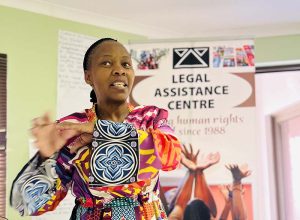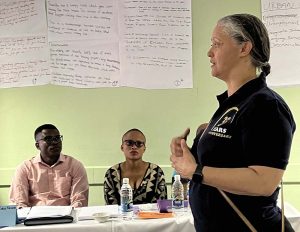 Empowering the San: Legal Capacity building for Human Rights
Empowering the San: Legal Capacity building for Human Rights
Successful Paralegal Induction Training in Windhoek
We are delighted to report on the successful completion of the Induction Training for paralegals serving San communities, held between September 9 to 13, 2024.
This essential community capacity-building initiative, generously funded by the European Union (EU), designed to enhance the legal knowledge and advocacy skills of participants, thereby empowering marginalized San communities throughout Namibia.
The project, which commenced in late 2023, was activated this year following an impactful two-day inception workshop on June 19-20, 2024, in Windhoek. The workshop gathered Chiefs, San community members, traditional leaders, government officials, civil society organizations, and rights activists, all dedicated to supporting this vital initiative. Their invaluable insights helped shape the paralegal training programme now fully underway.

Building Capacity Through Diverse Representation
Following the inception workshop (above photo), the LAC initiated a recruitment process resulting in the selection of twelve (12) trainee paralegals from diverse San communities across Namibia. This carefully curated group exemplifies the project’s commitment to inclusivity and representation. The training sessions were designed to empower these community-based trainee paralegals in effectively supporting their respective communities to advocate effectively for the rights of the San people. The training was delivered in a highly participatory manner, allowing for active participation, the sharing of ideas and experiences, and creating a comfortable atmosphere where everyone’s contributions were nurtured.
Participants engaged in group discussions, fostering an inclusive learning environment.
Legal Empowerment Through Education
The training emphasized the significance of legal empowerment, equipping participants with essential tools to navigate legal systems. Through intensive sessions focused on legal frameworks, human rights education, and practical advocacy strategies, participants gained a solid foundation for future community engagement.
Topics covered included community dynamics, human rights, land rights, access to education, health care, and cultural preservation. Engaging in role-playing exercises and case studies, participants actively applied their new knowledge, preparing for real-life legal scenarios in their communities.
Trainees participated in role-playing exercises to simulate real-life advocacy, information sharing and legal challenges.
A Commitment to Human Rights
The EU’s financial backing highlights its dedication to uplifting marginalized groups in Namibia, aligning with its goals of enhancing legal capacities and promoting inclusive development. The LAC shares this commitment and is a logical partner to the EU in implementing this initiative.
Looking Ahead
The induction training marks the beginning of a series of capacity-building workshops aimed at fostering collaboration among stakeholders. The skills acquired by the trainee paralegals are expected to lead to significant outcomes in San communities. Continuous feedback from participants will be crucial in refining future interventions tailored to their specific needs.
The “Empowering the San” project represents a pivotal step toward meaningful change, fostering resilience, and ensuring that the voices of the San people are heard and respected within the legal system.
A five-day field-based paralegal training is scheduled for November 19–23, 2024, in Gobabis and Vergenoeg in the Omaheke Region. The central theme of this particular training is community safety, with a special emphasis on the Vergenoeg San community’s experiences with community policing. The Vergenoeg community has been successful in developing and implementing community-led initiatives aimed at crime prevention and conflict resolution, providing valuable lessons for other San communities in Namibia.
Key Training Objectives:
- Enhance paralegals’ understanding of the relationship between community safety and access to justice, healthcare, education, and other essential services.
- Learn from the Vergenoeg community’s experience in community policing and explore how these strategies can be adapted and implemented in other San communities.
- Foster partnerships between paralegals, community leaders, law enforcement, and local authorities to support sustainable community safety and legal empowerment.
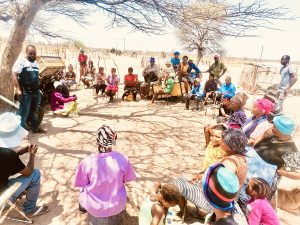 Special Focus on Vergenoeg’s Community Policing Initiatives: A key component of the training is a field visit to the Vergenoeg San community, located approximately 150 km from Gobabis. Here, the trainee paralegals will have the opportunity to engage with community leaders and learn first-hand about the community’s successful community policing initiatives. This visit will provide valuable insights into how community-driven efforts can improve safety, reduce crime, and ensure greater access to justice for marginalized groups.
Special Focus on Vergenoeg’s Community Policing Initiatives: A key component of the training is a field visit to the Vergenoeg San community, located approximately 150 km from Gobabis. Here, the trainee paralegals will have the opportunity to engage with community leaders and learn first-hand about the community’s successful community policing initiatives. This visit will provide valuable insights into how community-driven efforts can improve safety, reduce crime, and ensure greater access to justice for marginalized groups.
Training Programme Overview:
- Day 1: Arrival and orientation of participants, including trainee paralegals from across Namibia.
- Day 2: Full-day classroom sessions focusing on community safety and the role of paralegals in supporting legal rights and services.
- Day 3: Field visit to Vergenoeg to observe and learn from their community policing experiences.
- Day 4: Official introduction of selected trainee paralegals, with statements of support from local government representatives.
- Day 5: Reflection and wrap-up, as paralegals prepare to return to their communities with new skills to advance community safety and legal empowerment.
The Honorable Pijoo Nganate, Governor of the Omaheke Region, will officially introduce the selected trainee paralegals on November 22, 2024. The Governor’s address will highlight the importance of paralegals in advancing community safety and supporting the rights of marginalized communities.
Expected Outcomes: By the end of the training, the paralegals will have:
- Gained a deeper understanding of how community safety impacts legal rights and access to services.
- Developed practical skills in conflict resolution, community mediation, and legal support for safety-related issues, such as gender-based violence, land disputes, and youth crime prevention.
- Strengthened their capacity to collaborate with community leaders, local authorities, and law enforcement to build safer, more resilient communities.
Media Coverage of LAC-EU San Empowerment Project
Source-collection of coverage after sending out first press release before the Omaheke training unit
Kosmos Radio 20.11.2014 https://kosmos.com.na/regshulpsentrum-bemagtig-die-san/
Future Media News 20.11.2024 https://futuremedianews.com.na/2024/11/20/lac-launches-paralegal-training-for-san-communities-in-omaheke-region/
NBC TV News 21.11.2024 shared on https://youtu.be/6dLUJ-t9F00
Source-collection of coverage after sending out first press release after the Omaheke training unit
Namibian Economist 26.11.2024 https://economist.com.na/93580/community-and-culture/legal-assistance-centre-empowers-san-through-paralegal-training/
The Namibian 25.11.2024 https://www.namibian.com.na/legal-assistance-centre-and-european-union-empower-san-through-paralegal-training/
Namibian Sun 24.11.2024 https://www.namibiansun.com/com-we-focus/omaheke-san-learning-the-ins-and-outs-of-law2024-11-25141398
Inquiries:
Ms Corinna Van Wyk, Lead Project Coordinator, Legal Assistance Centre (LAC), Tel: +264 (0) 61 22 33 56, Email: cvanwyk@lac.org.na
Mr Twaku Kayofa, Press Officer, EU Delegation to Namibia, Tel: +264 (0) 61 290 6247, Email: Twaku.Kayofa@eeas.europa.eu






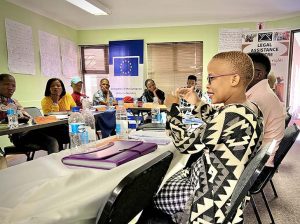




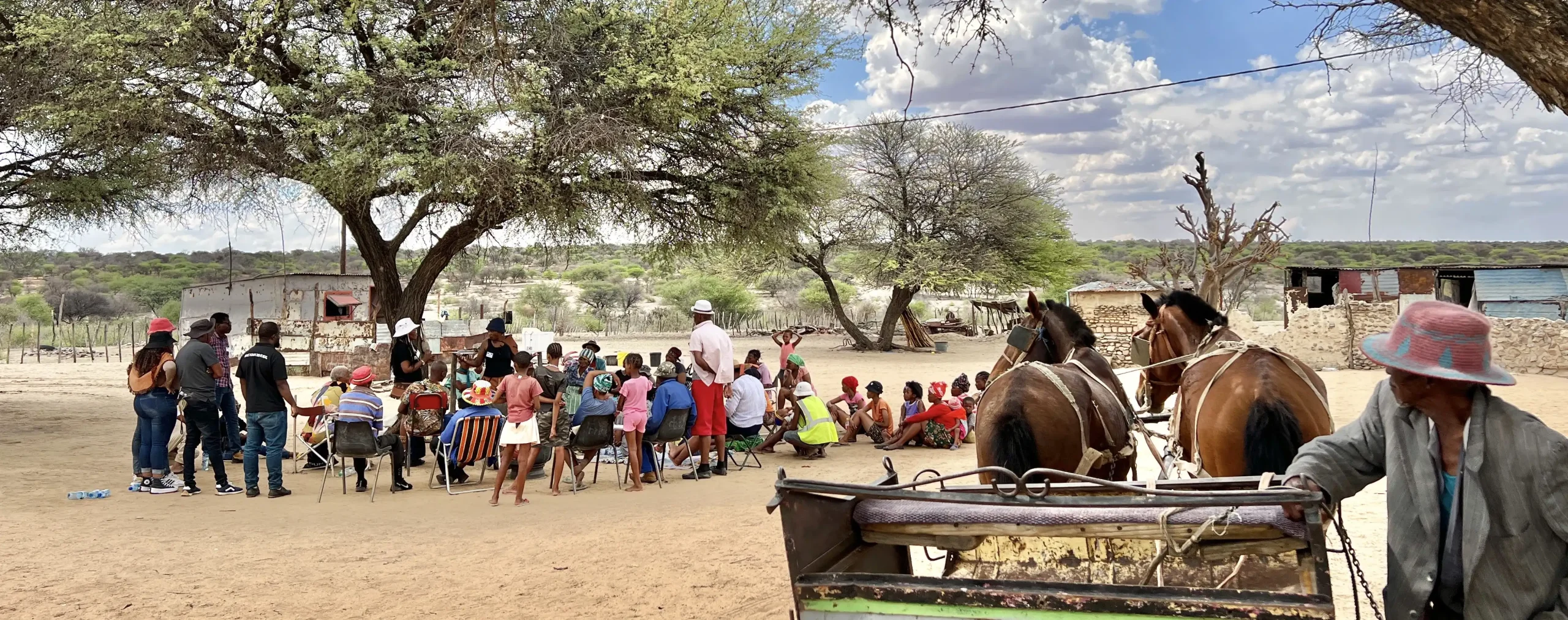 The trainees were also addressed by the Honorable Pijoo Nganate, Governor of the Omaheke Region, who encouraged them in his motivational talk in Gobabis. The Governor stressed the importance of paralegals advocating for the rights of their own communities, highlighting their essential role in promoting community safety and legal empowerment. In a passionate call for cultural pride and self-determination, Governor Nganate urged the trainees to embrace their San heritage and language, drawing inspiration from Malcolm X’s transformation of identity as an example of empowering change.
The trainees were also addressed by the Honorable Pijoo Nganate, Governor of the Omaheke Region, who encouraged them in his motivational talk in Gobabis. The Governor stressed the importance of paralegals advocating for the rights of their own communities, highlighting their essential role in promoting community safety and legal empowerment. In a passionate call for cultural pride and self-determination, Governor Nganate urged the trainees to embrace their San heritage and language, drawing inspiration from Malcolm X’s transformation of identity as an example of empowering change.
